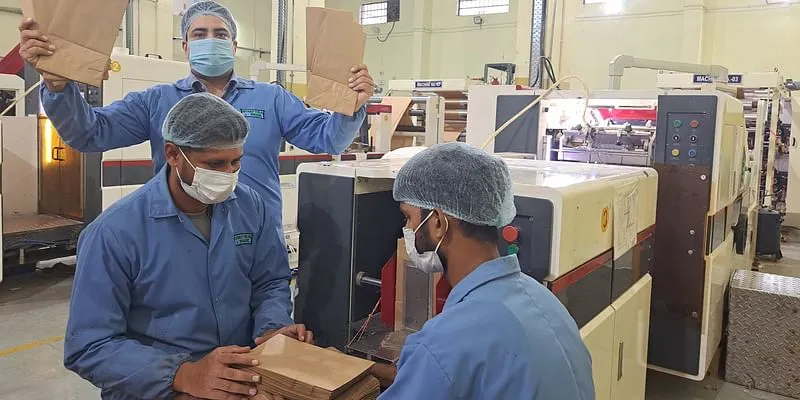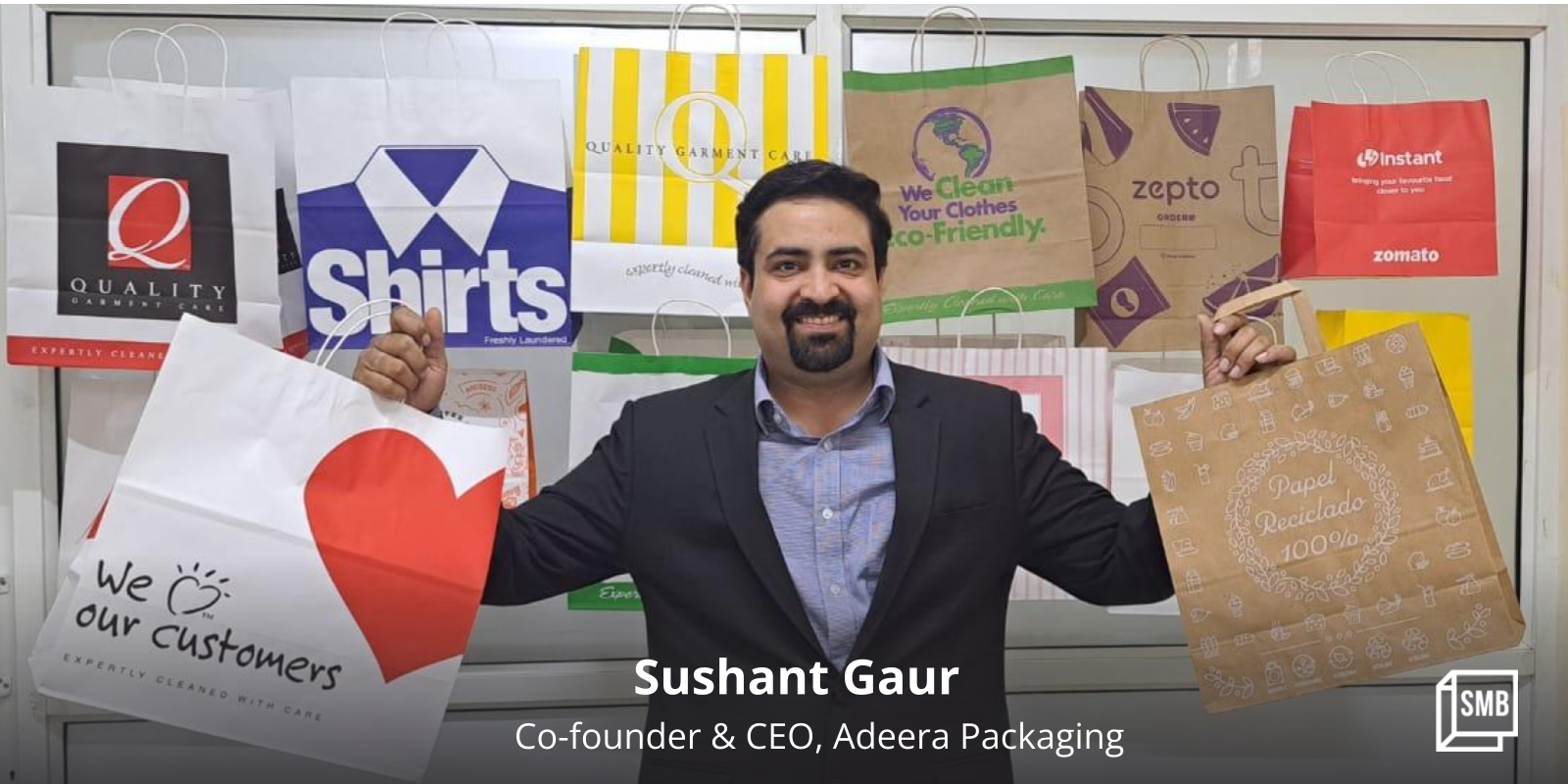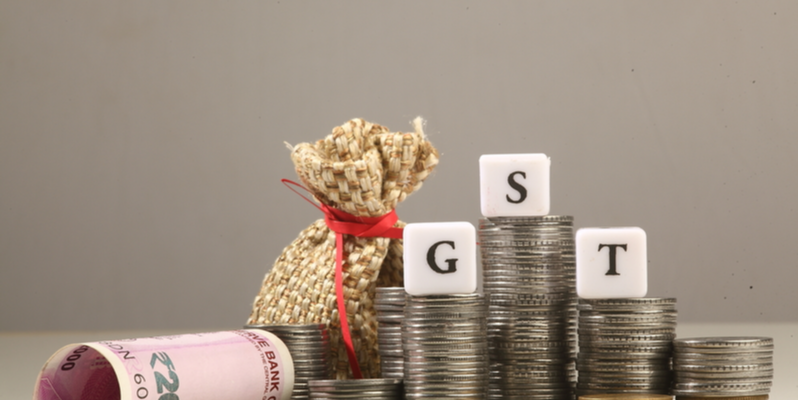This entrepreneur from Noida rebuilt his paper bag business, grew 10X amid the pandemic
Sushant Gaur gave Urja Packaging a do-over by joining hands with two co-founders to launch Adeera Packaging and grow the paper bag business 10X amid the pandemic.
In 2012, just after completing his MBA course, Sushant Gaur started his own business in Noida. He invested Rs 15 lakh to start , which manufactured paper bags. The founder envisioned strong growth as demand for paper bags was emerging alongside rising awareness on ditching plastic.
The idea was good, but convincing people to adopt paper over plastic was tough. He recalls going door-to-door to pharmacies, sweet shops, and local kiranas to sell his product in the initial days. At the end of the first year, his financial statements showed that he had earned Rs 15 lakh. No profit, no loss!
But things changed in the years that followed as Sushant bagged big clients like Fortis Hospital, Indian Railways, and Bikanervala. By 2019, Urja Packaging was making a turnover of Rs 3.5 crore.
Sushant says that while business growth was doubling every year, it wasn’t “substantial”.
“Proprietor-led companies cannot grow beyond a point. I was the one marketing, selling, and managing my business. One needs to have a team to scale the business, and in 2019 I joined hands with a long-term client, who had showed interest in the business, and began a new journey,” he says.
Sushant revamped Urja Packaging and relaunched it as Adeera Packaging after joining hands with Atulya Bhatia (the long-term client) and his childhood friend Ashish Agarwal, now directors of the company.
The trio reworked business strategies and got down to work.
Despite the pandemic, Adeera Packaging registered 10X growth and clocked a revenue of Rs 23.5 crore in FY22.
Sushant says the business growth they are witnessing is directly proportional to the product category expansion they have done over the past years and the division of work. The market has matured and consumer demand has grown after the government’s ban on single-use plastic.
According to IMARC, the India paper bag market size reached $650 million in 2021 and is expected to reach $896.2 million by 2027, at a CAGR of 5.3% during 2022-2027.
Adeera Packaging is all set to capitalise on this opportunity. It deals in all-purpose bags, offering square-bottom paper bags, V-bottom paper bags, twisted-handle carry bags, aluminium foil-lined bags, two-side open wrapping bags, flat-handle carry bags, and more.
Sushant says the company has bagged more than 200 clients, including Zepto, Apollo, KFC, Taco Bell, Dunkin Donuts, Food Darzee, and Nike in India. It has also added several international clients to its portfolio.
“We are now supplying our paper bags to clients in seven countries, including Spain, Italy, the US, the UK, and Australia.”
Adeera Packaging has set up five factories in Greater Noida, a warehouse in Delhi, and aims to scale up manufacturing by setting up a unit in the US by 2024. It currently sells five crore paper bags a month.

Adeera Packaging's manufacturing facility
Potential market in India
Adeera Packaging’s bags are BRCGS Grade A, FSC, ISO 9001 QMS, ISO 14001 EMS, GMP, and SA 8000-certified, but Sushant says there are many teething issues as the industry is less than 10 years old in India.
Giving an example, he says, “We had to convince paper mills to make paper specifically for paper bags, with higher moisture content unlike corrugated media paper. People don’t understand the difference in paper bags and packaging products.”
A UN report says five trillion plastic bags are used globally every year. The Volza import data highlights that there are around 250 paper bag machines in India for carry bags and square-bottom bags, translating into a peak output of six billion bags per year.
“Since India usually is 3% percent of the global packaging market, we can safely assume that usage of plastic bags in India would also be at 150 billion bags annually. The packaging industry in India is itself growing at 20-25%, according to the Packaging Industry Association of India,” Sushant says.
The ban on single-use plastic has created a shortage of replacements and an inorganic growth beyond 20-25% for certain segments of the industry like takeaway carry bags, Sushant says. “The potential of growth is huge and inorganic at the moment. As market leaders, we are growing at 2.5-3X.”
Adeera Packaging employs about 300 people at present, with most working in operations.
This 62-year-old entrepreneur is on a mission to reduce plastic packaging
Major challenges
Sushant feels one of the biggest challenges is that the plastic ban is not strictly followed in India.
“Many vendors and consumers are still using plastic bags. The paper bag business can only grow when consumers understand the harmful effects of plastic. Even though people are aware, they neglect this point. [This] can only be controlled by the government,” he says.
Sushant cites the example of Kenya, which has a no-nonsense approach to plastic waste. According to a UN report, Kenya is emerging as a leader in the fight against plastic pollution and is among the first countries in East Africa to limit single-use plastics and sign the Clean Seas initiative to rid waterways of plastic waste. “We envision Kenya-like strict measures in India plastic use,” he says.
Like most businesses, hiring is another ongoing challenge. “There is no centralised way to hire trained manpower in this industry as it is so new. This is why we have started an operator training module at our factory,” he says.
Sushant says the company competes with the likes of Novolex in the US and Papier-Mettler in Germany. However, he adds that the biggest competition comes from consumers “who prefer bringing their own cloth bags for shopping”.
Edited by Teja Lele










